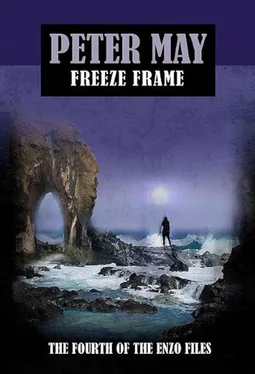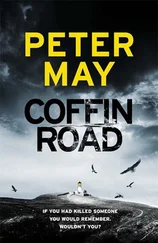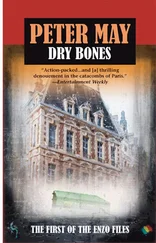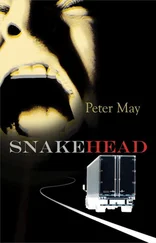Peter May - Freeze Frames
Здесь есть возможность читать онлайн «Peter May - Freeze Frames» весь текст электронной книги совершенно бесплатно (целиком полную версию без сокращений). В некоторых случаях можно слушать аудио, скачать через торрент в формате fb2 и присутствует краткое содержание. Жанр: Классический детектив, на английском языке. Описание произведения, (предисловие) а так же отзывы посетителей доступны на портале библиотеки ЛибКат.
- Название:Freeze Frames
- Автор:
- Жанр:
- Год:неизвестен
- ISBN:нет данных
- Рейтинг книги:5 / 5. Голосов: 1
-
Избранное:Добавить в избранное
- Отзывы:
-
Ваша оценка:
- 100
- 1
- 2
- 3
- 4
- 5
Freeze Frames: краткое содержание, описание и аннотация
Предлагаем к чтению аннотацию, описание, краткое содержание или предисловие (зависит от того, что написал сам автор книги «Freeze Frames»). Если вы не нашли необходимую информацию о книге — напишите в комментариях, мы постараемся отыскать её.
Freeze Frames — читать онлайн бесплатно полную книгу (весь текст) целиком
Ниже представлен текст книги, разбитый по страницам. Система сохранения места последней прочитанной страницы, позволяет с удобством читать онлайн бесплатно книгу «Freeze Frames», без необходимости каждый раз заново искать на чём Вы остановились. Поставьте закладку, и сможете в любой момент перейти на страницу, на которой закончили чтение.
Интервал:
Закладка:
He gazed from the window as the outskirts of Agadir grew up around the arterial route that led unwaveringly toward downtown. Nearly fifty years after the quake, it still looked like a town in ruins. Unfinished apartment blocks sprang up like weeds from the dust and rubble. Roads had been laid out around gap sites, and satellite dishes grew like fungus on unrendered cement. Here and there was the odd splash of colour, red, green, blue, amongst all the grey. Stores and stalls selling clothes and groceries. Enzo was reminded of video footage he had seen on TV of a bombed-out Beirut.
As they neared the coast and the city centre, they passed walled villas slumbering in the shade of tall trees, rows of store fronts open for business. The traffic thickened, like cholesterol slowing the bloodflow, until they reached the boulevard that followed the shoreline along the tourist strip. Luxury hotels, palm trees, manicured lawns.
Enzo saw the curve of the beach, a deep crescent of golden sand washed by warm north Atlantic waters. It stretched away into a hazy distance, where the land rose above the docks at the north end and the remains of the old kasbah stood on the hill above.
Enzo tapped the driver on the shoulder. “Could you take me to the kasbah?”
The driver shrugged, without turning. “Nothing to see there, monsieur.”
“All the same…”
He shrugged again. “Sure.”
Major new highways converged on an enormous circular junction at the foot of the hill where the original city had once stood, and the driver turned off, circumventing road works and bumping over broken tarmac before heading up toward the walls of the kasbah. The road wound steeply around the hillside before spilling them out into a large paved parking area.
“You walk from here,” the driver said. “I’ll wait for you.”
Enzo stood looking out over the wall that bounded the car park down on to the docks below, the marina, and the port where all the fishing boats were tied up in rows. Then he turned to brave the touts and stall holders who lined the climb toward the old gate. He brushed aside offers of carpets and jewelry, pottery and camel rides, bottles of soda and food proffered by filthy fingers. Faces that were hopeful on his approach spat imprecations at his back, and he passed through the old gateway, climbing up broken steps into the kasbah itself.
He had not known quite what to expect, but when finally he arrived, there was nothing to see. The old broken-down city walls contained only rubble, sand, and dusty desert shrubs clinging obstinately to cracks in the parched earth. An old man in a timeworn djellaba, his head wrapped in grey cloth, followed him around, holding out a black kid goat.
It was almost impossible to imagine this as a thriving town of streets and apartments, restaurants and souks, a place thronging with people and life. Those who had died here remained here, beneath the buildings that had fallen on them. Like one enormous cemetery where the bodies of many thousands were entombed for eternity, a reminder, if any were needed, of the forces that nature wielded over man.
And here, too, was where the three operatives of the Wiesenthal organisation had died as they were closing in on the war criminal, Erik Fleischer. The same place that Fleischer himself had supposedly perished. But all Enzo could see now in his mind’s eye was the yellow Post-it stuck between the pages of the Everyman encyclopaedia in Killian’s study. He did not die.
In the shadow of the hill, the road ran around the perimeter of the docks. Huge rusting sheds shimmered in the heat, and the hulking carcasses of half-built boats stood, ribs exposed, like the skeletons of strange beasts long extinct. The decaying remains of ancient fishing boats sat up in the dry docks like the rotting remains of beached whales, and hundreds of small, blue-painted fishing craft were tied up to lines of wooden posts stretching across the inner harbour.
The fish market and the Office National des Peches had been rebuilt since Fleischer’s day, a big square cream-coloured concrete building with pale blue stripes. A long gallery high up in the apex of the roof ran from one end of the building to the other, and windows all along its length looked down onto the trading floor below. Fish were beautifully laid out in colourful patterns in rectangular wooden boxes contained within numbered lots. Silver sea bream, red mullet, yellow snapper, sardines, white-coated buyers clustered around them in bidding frenzies. Raised voices echoed around the chamber as Enzo walked along the shiny wet concrete of the gallery with the latest in a long line of Fleischer’s successors.
Ahmed el Ghoumari was a personable young man with dark smiling eyes and unblemished olive skin. He wore an expensive suit, with a white shirt and red tie. His black shoes were polished to an impossible shine. He did not look like a man who managed a fish market.
“Your father’s uncle?” he said.
“No, he was on my mother’s side of the family. She was Italian, but her mother was French. Uncle Yves is the missing piece of the family jigsaw.”
“Of course, so many people died in the earthquake, their bodies never recovered. But I’m afraid Yves Vaurs was long before my time. I wasn’t even born then.” Ahmed el Ghoumari laughed, an infectious laugh full of unself-conscious good humour. “The only one I can think of who might have been around in those days was old Khalid.” There was an affection in his smile as he spoke the old man’s name. “Long past retirement, but no one has ever had the heart to ask him to go. He works in the accounts department now as a runner.” He chuckled. “I use the word ‘works’ advisedly. And it is probably about thirty years since he ran anywhere. He sits in the office and smokes cigarettes, and passes comment on the world, and has long lunches in the fish restaurant down the road. He will be only too happy to talk to you, monsieur.”
Khalid was even happier when Enzo offered to buy him lunch. He wore a grey and cream djellaba over faded jeans and open sandals, and he pulled the hood of it up over his baseball cap as they ventured out into the midday sun. He was an old man with a sun-dried face the colour and texture of a walnut. He walked with a limp and a stick, and had a hand-rolled cigarette permanently glued between his lips at the right-hand corner of his mouth.
Fish restaurants lined the road that led to the harbour, little more than prefab huts with open frontages and lines of plastic tables and chairs shaded by huge white parasols. Old Khalid ordered mixed seafood platters for them both and a jug of Pepsi-Cola. Enzo could have done with a beer or a chilled white wine. But neither was an option. Prodigious amounts of fried fish, prawns, and squid arrived on two enormous platters, and Khalid began gorging himself as if he hadn’t eaten for a week. For a man half Enzo’s size, it seemed as if he might be capable of eating twice as much.
“I was really just a gamin when Monsieur Vaurs was the manager here. Eighteen or nineteen. I started out on the fishing boats when I was twelve, but crushed my foot in a stupid accident when I was seventeen. I wasn’t fit for the fishing after that. It was Monsieur Vaurs who took me on here. Gave me a job when no one else would. He was a good man.”
Enzo remembered Cohen’s tale about the young prisoner in Mauthausen with the inflamed foot and wondered if Fleischer and Vaurs could really be the same person.
“Poor guy. Died in the earthquake. But just one of thousands, so maybe no one really grieved for him but me. I was lucky, lost no family. But everyone else was too busy grieving for parents, wives, husbands, children. It was a terrible time, monsieur. You have no idea.” He spat out some fishbones on to the plastic table cover and wiped his mouth with the back of his hand before slurping several mouthfuls of Pepsi.
Читать дальшеИнтервал:
Закладка:
Похожие книги на «Freeze Frames»
Представляем Вашему вниманию похожие книги на «Freeze Frames» списком для выбора. Мы отобрали схожую по названию и смыслу литературу в надежде предоставить читателям больше вариантов отыскать новые, интересные, ещё непрочитанные произведения.
Обсуждение, отзывы о книге «Freeze Frames» и просто собственные мнения читателей. Оставьте ваши комментарии, напишите, что Вы думаете о произведении, его смысле или главных героях. Укажите что конкретно понравилось, а что нет, и почему Вы так считаете.












